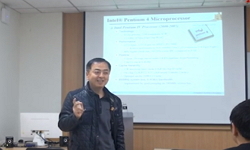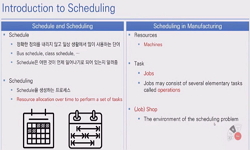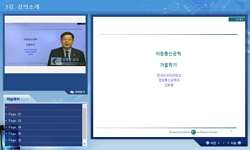This paper presents a novel user selection method basedon the signal-to-interference-plus-noise ratio (SINR),which is approximated using limited feedback data at thebase stations (BSs) of multiple user multiple-inputmultiple-output (MU-MIMO) systems. ...
http://chineseinput.net/에서 pinyin(병음)방식으로 중국어를 변환할 수 있습니다.
변환된 중국어를 복사하여 사용하시면 됩니다.
- 中文 을 입력하시려면 zhongwen을 입력하시고 space를누르시면됩니다.
- 北京 을 입력하시려면 beijing을 입력하시고 space를 누르시면 됩니다.
https://www.riss.kr/link?id=A103378653
- 저자
- 발행기관
- 학술지명
- 권호사항
-
발행연도
2014
-
작성언어
English
- 주제어
-
등재정보
KCI등재,SCI,SCIE,SCOPUS
-
자료형태
학술저널
- 발행기관 URL
-
수록면
62-68(7쪽)
-
KCI 피인용횟수
2
- 제공처
-
0
상세조회 -
0
다운로드
부가정보
다국어 초록 (Multilingual Abstract)
This paper presents a novel user selection method basedon the signal-to-interference-plus-noise ratio (SINR),which is approximated using limited feedback data at thebase stations (BSs) of multiple user multiple-inputmultiple-output (MU-MIMO) systems. In the proposedsystem, the codebook vector index, the quantization errorobtained from the correlation between the measuredchannel and the codebook vector, and the measured valueof the largest singular value are fed back from each user tothe BS. The proposed method not only generatesprecoding vectors that are orthogonal to the precodingvectors of the previously selected users and are highlycorrelated with the codebook vector of each user but alsoadopts the quantization error in approximating the SINR,which eventually provides a significantly more accurateSINR than the conventional SINR-based user selectiontechniques. Computer simulations show that the proposedmethod enhances the sum rate of the conventional SINRbasedmethods by at least 2.4 (2.62) bps/Hz when thenumber of transmit antennas and number of receiveantennas per user terminal is 4 and 1(2), respectively, with100 candidate users and an SNR of 30 dB.
참고문헌 (Reference)
1 S. Li., "R Bits User Selection Switch Feedback for Zero Forcing MU-MIMO Based on Low Rate Codebook" 2012 : 1-12, 2012
2 T. Yoo., "On the Optimality of Multiantenna Broadcast Scheduling Using Zero-Forcing Beamforming" 24 (24): 528-541, 2006
3 F. Pérez-Cruz., "MIMO Gaussian Channels with Arbitrary Inputs: Optimal Precoding and Power Allocation" 56 (56): 1070-1084, 2010
4 N. Jindal., "MIMO Broadcast Channels with Finite-Rate Feedback" 52 (52): 5045-5060, 2006
5 Z. Shen., "Low Complexity User Selection Algorithms for Multiuser MIMO Systems with Block Diagonalization" 54 (54): 3658-3663, 2006
6 S. Mishra., "Link Level Performance of Multiple Input Multiple Output (MIMO) System" 2 (2): 29-42, 2009
7 X. Xia., "Leakage-Based User Scheduling in MU-MIMO Broadcast Channel" 52 (52): 2259-2268, 2009
8 X. Xia., "Joint User Pairing and Precoding in MU-MIMO Broadcast Channel with Limited Feedback" 14 (14): 1032-1034, 2010
9 D.J. Love., "Grassmannian Beamforming for Multiple-Input Multiple-Output Wireless Systems" 49 (49): 2735-2747, 2003
10 C. Shin., "Efficient User Scheduling Algorithm for Enhancing Zero-Forcing Beamforming in MIMO Broadcast Channels" E94-B (E94-B): 2908-2911, 2011
1 S. Li., "R Bits User Selection Switch Feedback for Zero Forcing MU-MIMO Based on Low Rate Codebook" 2012 : 1-12, 2012
2 T. Yoo., "On the Optimality of Multiantenna Broadcast Scheduling Using Zero-Forcing Beamforming" 24 (24): 528-541, 2006
3 F. Pérez-Cruz., "MIMO Gaussian Channels with Arbitrary Inputs: Optimal Precoding and Power Allocation" 56 (56): 1070-1084, 2010
4 N. Jindal., "MIMO Broadcast Channels with Finite-Rate Feedback" 52 (52): 5045-5060, 2006
5 Z. Shen., "Low Complexity User Selection Algorithms for Multiuser MIMO Systems with Block Diagonalization" 54 (54): 3658-3663, 2006
6 S. Mishra., "Link Level Performance of Multiple Input Multiple Output (MIMO) System" 2 (2): 29-42, 2009
7 X. Xia., "Leakage-Based User Scheduling in MU-MIMO Broadcast Channel" 52 (52): 2259-2268, 2009
8 X. Xia., "Joint User Pairing and Precoding in MU-MIMO Broadcast Channel with Limited Feedback" 14 (14): 1032-1034, 2010
9 D.J. Love., "Grassmannian Beamforming for Multiple-Input Multiple-Output Wireless Systems" 49 (49): 2735-2747, 2003
10 C. Shin., "Efficient User Scheduling Algorithm for Enhancing Zero-Forcing Beamforming in MIMO Broadcast Channels" E94-B (E94-B): 2908-2911, 2011
11 I.S. Dhillon., "Constructing Packings in Grassmannian Manifolds via Alternating Projection" 17 (17): 9-35, 2008
12 J. Karedal., "A MIMO Channel Model for Wireless Personal Area Networks" 9 (9): 245-255, 2010
동일학술지(권/호) 다른 논문
-
Distributed Synchronization for OFDMA-Based Wireless Mesh Networks
- 한국전자통신연구원
- 김지형
- 2014
- KCI등재,SCI,SCIE,SCOPUS
-
A Fast and Precise Blind I/Q Mismatch Compensation for Image Rejection in Direct-Conversion Receiver
- 한국전자통신연구원
- 김선아
- 2014
- KCI등재,SCI,SCIE,SCOPUS
-
- 한국전자통신연구원
- 이상준
- 2014
- KCI등재,SCI,SCIE,SCOPUS
-
Quasi-distributed Interference Coordination for HSPA HetNet
- 한국전자통신연구원
- Chi Zhang
- 2014
- KCI등재,SCI,SCIE,SCOPUS
분석정보
인용정보 인용지수 설명보기
학술지 이력
| 연월일 | 이력구분 | 이력상세 | 등재구분 |
|---|---|---|---|
| 2023 | 평가예정 | 해외DB학술지평가 신청대상 (해외등재 학술지 평가) | |
| 2020-01-01 | 평가 | 등재학술지 유지 (해외등재 학술지 평가) |  |
| 2005-09-27 | 학술지등록 | 한글명 : ETRI Journal외국어명 : ETRI Journal |  |
| 2003-01-01 | 평가 | SCI 등재 (신규평가) |  |
학술지 인용정보
| 기준연도 | WOS-KCI 통합IF(2년) | KCIF(2년) | KCIF(3년) |
|---|---|---|---|
| 2016 | 0.78 | 0.28 | 0.57 |
| KCIF(4년) | KCIF(5년) | 중심성지수(3년) | 즉시성지수 |
| 0.47 | 0.42 | 0.4 | 0.06 |







 ScienceON
ScienceON






